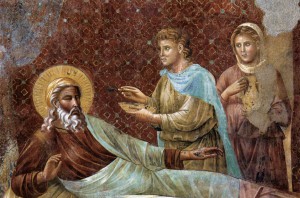Romans 9:22-23
The Forest and the Trees
Studying Romans is like hiking through a forest full of fascinating trees. We’ve been studying individual trees one-by-one for weeks in chapter nine: God chose Isaac, not Ishmael; God chose Jacob, not Esau; God has mercy on whomever he wills and hardens whomever he wills, etc. Before looking at another tree, lets step back and remember the forest.
Paul is writing to the Christians in Rome who are composed of Jews and Gentiles, two very different groups of people. He hopes to unite them with a thorough teaching of the gospel. The gospel is the good news that Jesus was God in the flesh. He lived the life we’ve failed to live, died the death we deserved and rose again to give his people new and eternal life.
In the gospel, God is up to something BIG. Bigger than saving Israel. Bigger than saving people who try to be good. He’s up to something that flexes the muscles of his sovereignty.
Before we inspect these two difficult verses, we must remember that God is not explaining himself, he’s asserting himself. Paul is not explaining predestination, free will, and election. He’s relentlessly hammering the nail of God’s sovereignty until it holds firm to our hearts. (For more on how I came to this conclusion, click here.)
So the question to ask yourself as you study these verses isn’t, does all this make sense and fit neatly into my world view? The question is, will I accept the Sovereign’s sovereignty? Will I accept the Divine’s divinity? Will I accept the Lord’s lordship?
I believe this is why he begins verse 22 with: What if God…
What If?
There is much debate over the proper translation of Romans 9:22-23, including these opening words. Most experts seem to agree that ‘what if God’ is pretty accurate. However, there is no such consensus about why he begins this way. Here is my theory:
I think Paul believes what he’s about to write is true; but his purpose here isn’t to explain it. So he presents it hypothetically to make his point: ‘So what if the hardest edges of God’s sovereignty are true?’
In other words, these verses do not fill out our understanding of God’s sovereignty. They challenge our acceptance of it.
Acceptance and Understanding
We usually like understanding before we’ll accept something. But with the deepest things in life, acceptance precedes understanding.
Is it customary for a child to understand his parents’ reasons before accepting their authority? No, a child must accept his parents’ authority first, and understanding comes over time. Do a bride and groom comb through their vows to make sure they understand them and how they’ll apply to various situations before accepting them? No, they accept the vows and then find out what they mean in real life as a married couple in the years that follow.
In the deep things of life, acceptance is the doorway to understanding. Perhaps this is why many of us will never come to a comfortable understanding of God’s sovereignty. We won’t accept it. We insist on understanding it first.
Yet, the apostle Peter himself said that some of Paul’s writings “are hard to understand.” When preaching through Romans 9, John Piper said,
How God renders certain the belief and unbelief of men without undermining our accountability I do not fully understand. If this stretches your mind to the breaking point, better that your minds be broken than that the scriptures be broken. And even better yet would be to let your mind and heart be enlarged rather than broken, so that they can contain all that the scriptures teach.
Similarly, John MacArthur said during his Romans 9 sermons,
I’m not real comfortable with this in my human mind. But I’m sure clear what it says. And the rest I take by faith… [A]nd you’re still scratching your head and you’re saying, “I don’t understand that” and my friend, I’m scratching my head with you. But, I’m believing…
To put flesh on this idea of acceptance first, note the following story shared by Ligon Duncan. After preaching on a similar text as ours, a pastor named Benjamin Morgan Palmer was confronted by an angry young man from the congregation:
“You preachers are the most contradictory men in the world,” he said. “Why, you said in your sermon that sinners were perfectly helpless in themselves, utterly unable to repent or believe, and then you turned around and said we would be damned if did not.” Palmer sensed that his visitor was wrestling with the great issues of life and death, and to make sure that the man really dealt with the gospel, he gave him an indifferent response. “Well, my dear sir, there is no use in quarreling; either you can or you can’t. If you can repent and believe, all I have to say is, ‘I just hope you go and do it.’” Palmer then describes what happened next. “As I did not raise my eyes from writing, I had no means of marking the effect of these words on the gentleman until after a moment’s silence, with a choking utterance, the reply came back, ‘I have been trying my best for three whole days and I can not.’” “Ah,” I responded, “that puts a different face upon it. We will go and tell this difficulty straight to God. We knelt down and I prayed as though this was the first time in human history that this trouble had ever arisen, and that here was a soul in the most desperate extremity who must believe or perish, and hopelessly unable of it self to do it, and consequently that it was just a case of divine interposition. Upon rising I offered not one single word of comfort or advice. And so I left my friend, in his powerlessness, in the hands of God as his only helper. In a short time he came through the struggle rejoicing in the hope of eternal life.”
So, with all this in mind, let’s walk through these two verses and take in Paul’s four suggestions. What if God is this way? Will you accept it?
1. What God wants to do.
What if God, desiring to show his wrath and to make known his power…
When I used to play tennis I was pretty good. Since I was pretty good, I wanted the people I cared about to come and see me play. A good tennis player wants his tennis skills to be known. The great Being wants his entire being to be known, including his glorious wrath and power. And this desire is partly behind his sovereign choices regarding salvation.
2. What God does.
What if God… has endured with much patience vessels of wrath prepared for destruction…
Why does God allow Satan to continue his work? Why did God allow Pharoah to live so long? Why did God allow Hitler to live so long? For that matter, why does God allow us to continue, since we’re born ‘children of wrath’ (Ephesians 2:3)? Is God impotent or up to something?
Remember verse 17? The reason God raised up Pharoah was to show his power to make his name famous. The answer to the above questions has to do with his desire to display his glorious wrath and power.
3. Why God does it.
What if God… has endured with much patience vessels of wrath prepared for destruction, in order to make known the riches of his glory for vessels of mercy, which he has prepared beforehand for glory –
Ever wonder how the angels in Isaiah and Revelation can sing “Holy, holy, holy!” forever and not grow tired or it? Because God is unbelievably glorious. In heaven, the vessels of mercy too will be eternally captivated by God’s glory, which will shine even brighter in light of the way he deals with vessels of wrath.
4. How God does it.
What if God… has endured with much patience vessels of wrath prepared for destruction, in order to make known the riches of his glory for vessels of mercy, which he has prepared beforehand for glory–
Paul’s language leaves it unclear who prepared the vessels of wrath for destruction, while it confirms that God himself prepared the vessels of mercy for glory. But it seems obvious from the potter/clay analogy that God does all the preparing for all the vessels.
God allows some to store up for themselves wrath (Romans 2:5) so that the display of his glorious power in their judgment will be more awesome.
Think of Pharoah. God didn’t end it with plague number one. Instead, he turned water to blood, sent frogs, gnats, flies, famine, boils, hail, locust, darkness, and killed all the Egyptian first-born. Then he split a sea. He worked in such a way as to maximise the display of his glory to the vessels of mercy (Israel).
Some Questions
Will you accept that God has a deep desire for the display of his glory and that this desire supercedes our desires? Will you accept that God’s glory is magnified even by the lives and actions of people who will receive wrath and destruction? Will you accept that God is up to something big, beyond our understanding? Will you say with Paul,
Oh, the depth of the riches and wisdom and knowledge of God! How unsearchable are his judgments and how inscrutable his ways! “For who has known the mind of the Lord, or who has been his counselor?” “Or who has given a gift to him that he might be repaid?” For from him and through him and to him are all things. To him be glory forever. Amen. (Romans 11:33-36)
Discussion Starters
- What do you think is the key message of this passage?
- What did you learn from this passage (something you didn’t previously know)?
- Which point in this chapter spoke to you the most?
- Why do you think God included this chapter in the Bible? What’s the point?
- Are there truths in this passage that contradict the ideas we hear in the world? If so, what are they?
- Is there something in this passage that surprised you? If so, how were you surprised?
- Are there any verses in this passage that confuse you or that seem to contradict other parts of the Bible?
- In view of what we have read, what changes do you think God would want you to make in attitude, words, or actions?








